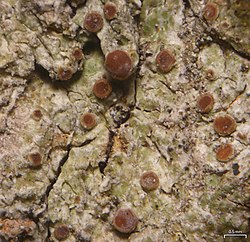Biology:Obscuroplaca
| Obscuroplaca | |
|---|---|

| |
| Obscuroplaca camptidia growing on oak in Delmarva, Virginia | |
| Scientific classification | |
| Domain: | Eukaryota |
| Kingdom: | Fungi |
| Division: | Ascomycota |
| Class: | Lecanoromycetes |
| Order: | Teloschistales |
| Family: | Teloschistaceae |
| Genus: | Obscuroplaca Søchting, Arup & Bungartz (2021) |
| Type species | |
| Obscuroplaca camptidia (Tuck.) Søchting, Arup & Bungartz (2021)
| |
| Species | |
|
O. camptidia | |
| Synonyms[1] | |
| |
Obscuroplaca is a genus of lichen-forming fungi in the family Teloschistaceae. It contains three species of corticolous (bark-dwelling), crustose lichens.[2]
Taxonomy
The genus, published in 2021 by lichenologists Ulrik Søchting, Ulf Arup, and Frank Bungartz, is a replacement for Phaeoplaca,[3] an illegitimate name circumscribed by the same authors the previous year. The genus name combines the Latin obscuro ("dark", alluding to the dull colour of the thallus, which lacks the bright anthraquinones typical of other Teloschistaceae members), with placa, a reference to Caloplaca, the genus from which the species were originally transferred.[4]
Obscuroplaca occupies a distinct and well-defined clade within the subfamily Caloplacoideae of the family Teloschistaceae.[4]
Description
The thallus of Obscuroplaca species grows on tree bark, and is characterized by its crustose form and a surface marked by cracks and fissures. When it comes to reproduction, this lichen develops biatorine apothecia, which are typically brown in colour. Inside these apothecia are clavate-shaped asci of the Teloschistes type, each containing eight spores. These ascospores have a polaribilocular structure with a wide septum.[4]
Species
Obscuroplaca species occur in Australia, the Galápagos Islands, Mexico, and the southeastern USA.[4]
- Obscuroplaca camptidia (Tuck.) Søchting, Arup & Bungartz (2021)
- Obscuroplaca ochrolechioides (S.Y.Kondr. & Kärnefelt) Søchting & Bungartz (2021)
- Obscuroplaca tortuca (Søchting & Bungartz) Søchting & Bungartz (2021)
References
- ↑ "Synonymy. Current Name: Obscuroplaca Søchting, Arup & Bungartz, in Bungartz, Søchting & Arup, Plant and Fungal Systematics 66(2): 240 (2021)". Species Fungorum. https://www.speciesfungorum.org/Names/SynSpecies.asp?RecordID=841162.
- ↑ "Obscuroplaca". Species 2000: Naturalis, Leiden, the Netherlands. https://www.catalogueoflife.org/data/taxon/B2SBJ.
- ↑ Bungartz, F.; Søchting, U.; Arup, U. (2021). "Obscuroplaca gen. nov. – a replacement name for Phaeoplaca; Teloschistaceae (lichenized Ascomycota) from the Galapagos Islands". Plant and Fungal Systematics 66 (2): 240–241. doi:10.35535/pfsyst-2021-0022.
- ↑ 4.0 4.1 4.2 4.3 Bungartz, Frank; Søchting, Ulrik; Arup, Ulf (2020). "Teloschistaceae (lichenized Ascomycota) from the Galapagos Islands: a phylogenetic revision based on morphological, anatomical, chemical, and molecular data". Plant and Fungal Systematics 65 (2): 515–576. doi:10.35535/pfsyst-2020-0030.
Wikidata ☰ Q122924224 entry
 |

